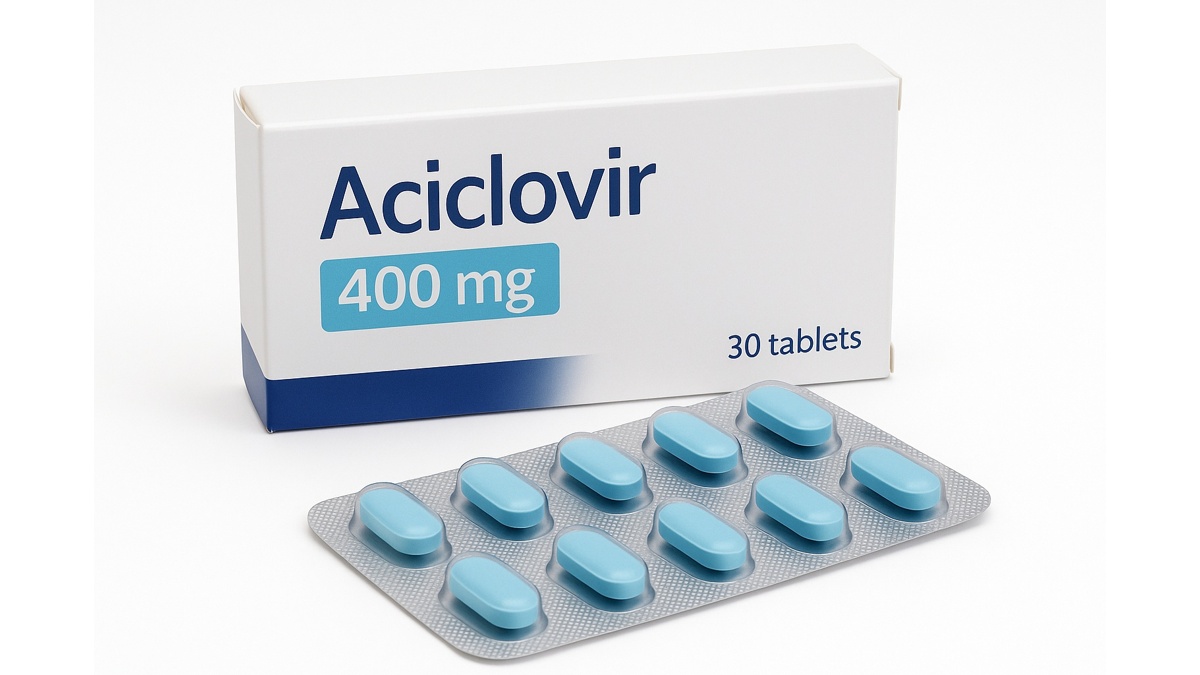
Manufacturer: Various
Known as: Aciclovir / Acyclovir
| Package | Price | Per pill |
|---|---|---|
| 10 pills | $25.55 | $2.56 |
| Package | Price | Per pill |
|---|---|---|
| 20 pills | $28.31 | $1.42 |
| Package | Price | Per pill |
|---|---|---|
| 20 pills | $26.02 | $1.30 |
Read the instructions carefully
Place an order in a few clicks >>
Description of Aciclovir
Aciclovir is a well-established antiviral medication used worldwide for over 40 years. It remains one of the most trusted therapies for infections caused by the herpes virus family. If you are wondering how aciclovir works, the drug acts as a guanosine analogue. After entering virus-infected cells, it is activated by the viral enzyme thymidine kinase into acyclovir triphosphate. This active form blocks viral DNA polymerase, preventing the virus from replicating while leaving healthy human cells largely unaffected.
The result is that outbreaks heal faster, symptoms such as pain and itching are reduced, and recurrence can be controlled with long-term therapy. Although aciclovir does not cure herpes or eliminate the virus from the body, it significantly improves quality of life by suppressing viral activity.
Learn more: detailed explanation of how antiviral drugs interrupt viral life cycles.
Aciclovir Tablets – Indications and Purpose of Use
- Herpes simplex virus (HSV-1, HSV-2): treatment of genital herpes and cold sores.
- Shingles (herpes zoster): reduces pain, speeds up healing, and lowers the risk of postherpetic neuralgia.
- Chickenpox (varicella): especially in adults, who are at higher risk of complications.
- Suppressive therapy: daily low-dose aciclovir can reduce the frequency of recurrent outbreaks by up to 80%.
- Prophylaxis in immunocompromised patients: such as those undergoing chemotherapy or organ transplantation, where herpes infections can be life-threatening.
Compared to newer antivirals like valaciclovir, aciclovir has a shorter half-life, which means more frequent dosing. However, its affordability and long safety record make it the most widely used option globally.
Aciclovir 400mg Dosage for Adults – How to Take
Correct dosage depends on the condition being treated, but aciclovir 400mg dosage for adult patients is the most common prescription strength.
| Indication | Typical Dosage | Duration | Notes |
|---|---|---|---|
| Genital herpes – first episode | 400 mg 3x daily | 7–10 days | Begin as early as possible after onset of symptoms |
| Genital herpes – recurrent episodes | 400 mg 3x daily | 5 days | Start at first sign (tingling/itching) |
| Suppressive therapy (prevention) | 400 mg 2x daily | Long-term, reassess after 6–12 months | Reduces frequency of recurrences |
| Shingles (herpes zoster) | 800 mg 5x daily | 7 days | Higher dose required |
| Chickenpox (varicella) | 800 mg 4x daily | 5 days | For immunocompromised adults |
Aciclovir how to take:
- Tablets should be swallowed with water, with or without food.
- Doses should be spaced evenly (every 8 or 12 hours depending on the schedule).
- Adequate hydration is important to protect kidney function, especially in older adults.
- Never stop therapy early, even if symptoms improve, as this can reduce effectiveness and increase the chance of resistance.
Side Effects of Aciclovir and Safety Considerations
Like all antiviral medications, aciclovir may cause side effects. Most are mild and temporary, but knowing them helps patients use the medicine safely.
Common side effects of aciclovir include:
- Nausea, vomiting, diarrhea
- Headache, dizziness, or fatigue
- Mild skin rash or itching
These effects are dose-dependent and usually improve as treatment continues.
Less common but clinically important risks:
- Kidney problems, particularly in patients with dehydration or preexisting kidney disease. Drinking plenty of water during treatment reduces this risk.
- Neurological reactions such as confusion, tremors, or even hallucinations, more often seen in elderly patients or those with renal impairment.
- Allergic reactions, rarely progressing to severe forms such as anaphylaxis.
Long-term safety:
Aciclovir has been studied extensively and is considered safe for prolonged use in suppressive therapy against recurrent herpes. Continuous use for months or even years is possible when prescribed by a physician, with periodic kidney function monitoring.
Special considerations:
- Elderly patients: higher sensitivity to kidney and neurological side effects; dose adjustment is often required.
- Pregnant women: evidence shows aciclovir can be used when clearly needed, but only under medical supervision.
- Immunocompromised patients: may require higher or more frequent doses, with closer monitoring to prevent complications or resistance.
Important note: Aciclovir should always be prescribed and monitored by a healthcare professional. Patients should never adjust the dose or stop therapy without consulting a doctor.
Drug Interactions and Precautions
- Nephrotoxic medicines (e.g., aminoglycosides, cyclosporine, tacrolimus) can increase the risk of kidney damage when combined with aciclovir.
- Probenecid can raise blood levels of aciclovir, requiring careful monitoring.
- Immunosuppressants may demand dose adjustment to maintain antiviral protection.
Patients with kidney disease, neurological disorders, or dehydration should be especially cautious. Doctor consultation is essential before starting therapy.
